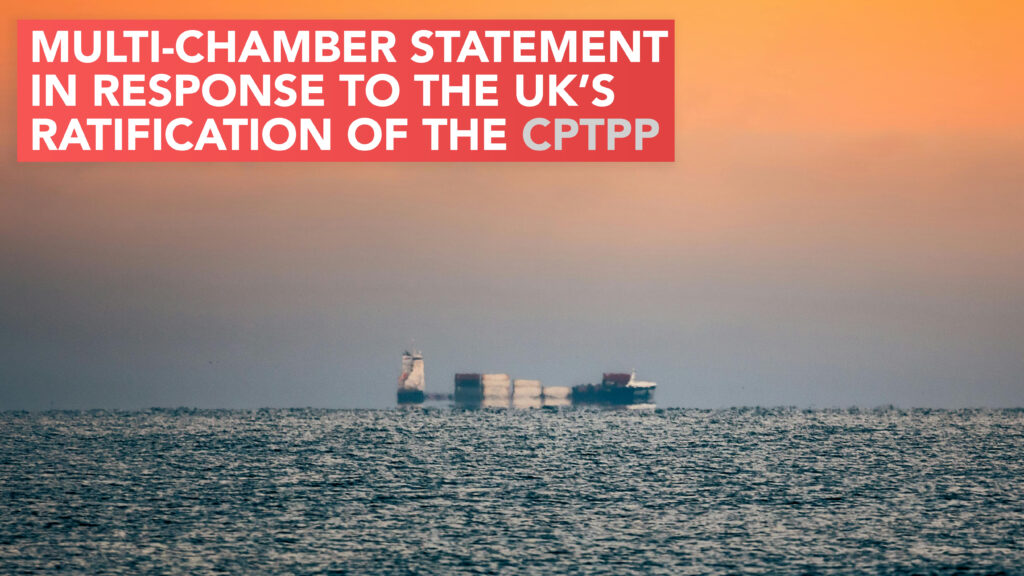Member? Please login
DIT publishes ‘UK-Japan free trade agreement: the UK’s strategic approach’ document

Written by BCCJ
May 15, 2020
UK Gov / British Embassy Tokyo, UK-Japan Relations
On May 13, the Department for International Trade (DIT) published a 94-page document laying out the strategic approach for securing a bilateral trade agreement with Japan.
This document explains the UK government’s:
- negotiating objectives for an enhanced trade agreement between the UK and Japan
- response to the call for input on a trade agreement between the UK and Japan, including how the call for input informed the UK’s negotiating objectives
- initial assessment of the potential long-term impacts of a trade agreement between the UK and Japan
In January 2019, the UK and Japan agreed to negotiate a new bilateral agreement using
the existing EU-Japan Economic Partnership Agreement (EPA) as a basis, ensuring the new agreement is as ambitious, high standard and mutually beneficial as the EPA and enhanced in areas of mutual interest.
An FTA with Japan was stated as representing “significant opportunities throughout the economy, from agriculture to digital and to increase the resilience of our supply chains and the security of our whole economy as we diversify our trade. Japan is a developed economy with high standards. The UK and Japan are major investors in each other’s economies, ranking fifth and sixth respectively for inward foreign direct investment in 2018.
Potential benefits from a deal include better jobs, higher wages, more choice and lower prices for all parts of the UK. The total value of trade between the UK and Japan in 2018 was just over £29 billion.3 A UK-Japan FTA could increase trade between both countries by £15.2 billion in the long run (compared to 2018) and increase UK workers’ wages by £800 million.4 This analysis relates to the long term, and implicitly assumes that by that period the economy would have recovered from any impacts of the coronavirus. At this point in time it is too early to identify whether or how the estimated impacts in this document might be affected by the current situation.
Removing trade barriers with Japan could deliver huge gains, both for the 8,000 UK Small and Medium-Sized Enterprises (SMEs) across the UK already exporting goods with Japan as well as those making plans to enter the Japanese market. For example, total annual tariff reductions on goods exports to Japan could be worth around £33 million per year in the long run.
Sectors set to benefit from a deal include textiles, agriculture, and the services industry. Now that we have left the EU, we can also make more progress in areas such as the free flow of data, which will support emerging fields such as Artificial Intelligence (AI) and the UK’s position as a technology superpower.”
Negotiating Objectives for a Free Trade Agreement with Japan Overall Objectives:
- Agree an ambitious and comprehensive Free Trade Agreement (FTA) with Japan that builds on the EUJapan Economic Partnership Agreement (EPA), and secures additional benefits for UK businesses.
- Increase UK GDP and provide new opportunities for UK businesses, including Small and Medium sized Enterprises (SMEs) and investors, and facilitating greater choice and lower prices for UK producers and consumers.
- Increase the resilience of our supply chains and the security of our whole economy by diversifying trade.
- The Government has been clear that when we are negotiating trade agreements, the National Health Service (NHS) will not be on the table. The price the NHS pays for drugs will not be on the table. The services the NHS provides will not be on the table. The NHS is not, and never will be, for sale to the private sector, whether overseas or domestic.
- Throughout the agreement, ensure high standards and protections for UK consumers and workers and build on our existing international obligations. This will include not compromising on our high environmental protection, animal welfare and food standards, and ensure both parties meet their commitments on climate change.
- Secure an agreement which works for the whole of the UK and takes appropriate consideration of the UK’s constitutional arrangements and obligations.
Read full document HERE






